| July
14, 2006
Presenting: Lenny Lombardi from CHIN Radio
– Pioneering Canada’s Multicultural Vision
As you know by now, www.travelandtransitions.com
has dedicated itself to building bridges between people of different
places and different backgrounds. There are many organizations and
individuals out there who believe in the same cause, and none more
so than Toronto’s legendary Lombardi family. Johnny Lombardi
was a musician, WWII veteran, successful supermarket owner, impresario,
entertainer and founder of Toronto’s CHIN radio station.
CHIN Radio is
Ontario’s first multicultural and multilingual radio station
and today broadcasts in the Toronto and Ottawa area. The programs
are beamed out from Toronto on CHIN AM1540 and FM 100.7, and in
the Ottawa/Gatineau region on 97.9 FM CJLL.
CHIN’s radio programs reach audiences in more than 30 languages
and an even greater number of cultural communities. CHIN Radio is
also available via satellite across North America on Anik F1, Ku-Band,
Transponder 18, and world-wide listeners can tune in live on the
Internet at www.chinradio.com.
In addition, CHIN also produces multicultural television programs
for the Italian, Hindi, Indo-Caribbean, Iranian, Pakistani, Polish,
Portuguese and Russian communities which are broadcast to a Toronto
audience on Saturdays and Sundays.
The original person behind this multilingual communications empire
is none other than Johnny Lombardi (1915 – 2002), a son of
Italian immigrants who came to Canada in the early 1900s from the
southern Italian region of Basilicata. I had the opportunity to
talk to Johnny’s son, Lenny Lombardi, President of CHIN Radio,
to find out more about his family’s commitment to multiculturalism.
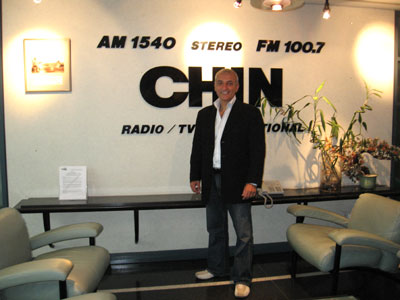
Lenny Lombardi, President of CHIN Radio & Television
In his office in Toronto’s
Little Italy I sat down comfortably with Lenny who struck me
right away with his down-to-earth demeanour and razor-sharp intellect.
It is quite obvious that Lenny’s outlook on life was shaped
strongly by his father and he started to tell me some more personal
information about Johnny Lombardi, a local legend and recipient
of many Canadian awards and honours which include Broadcaster of
the Year, Entrepreneur of the Year, the Order of Canada and many
more.
Lenny shared with me that his father grew up in extremely poor
conditions after his parents' arrival in Canada. I inquired why
multiculturalism was such a driving force in Johnny’s life
and Lenny explained that early on his father felt the sting of prejudice.
However, he was a talented musician and at 17 years of age Johnny
Lombardi founded his first band. With the young Johnny Lombardi
at the helm, this musical group included many adult members that
followed Johnny’s leadership. He was a real go-getter and
eventually played the lead trumpet in the Benny Palmer Orchestra,
second in stature only to Guy Lombardo. And along the way Johnny
learned that music helped him integrate into mainstream Canadian
society and gained him acceptance and respect. He was well on his
way towards becoming a success story.
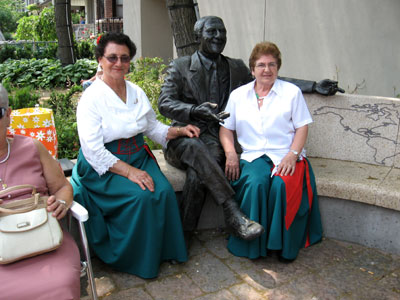
Two members of the Coro Italia choir sit down with Johnny Lombardi
Then World War II came, and Johnny Lombardi actually enlisted in
the war rather than waiting to get drafted. He realized that this
would give him access to more opportunities for advancement. During
the war he was sent to Europe and fought in France, Germany and
Holland, but fortunately he never had to fight in Italy, the country
where his family had come from. Johnny was a decorated soldier and
participated in D-Day to liberate Europe from the Nazis. Yet despite
his dedication he felt a deep sense of alienation and aloneness.
Lenny refers to it as a sense of disorientation due to missing his
homeland, feelings that had a deep impact on Johnny.
When the war came to an end Johnny Lombardi began to entertain Canadian
troops that were stuck in Holland, waiting to be discharged from
the army. Being the bridge-builder that he was, Johnny started to
organize dances, bringing together Canadian soldiers and local townspeople.
And he brought in music from Canada, based on a keen understanding
of how important familiar things are to all of us: music, language,
food, traditions….
After the Second World War a huge wave of immigrants came to Canada
from Italy, and Johnny, with his uncanny gift of psychological insight,
realized that just as he had missed familiar Canadian things during
his time in Europe, these Italian immigrants would certainly have
to be missing their familiar foods, products and culture from Italy,
the ever-important “creature comforts” that make us
feel at home in a new place.
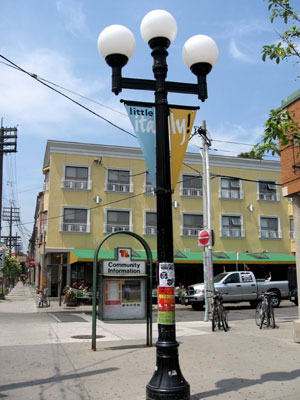
Images of Little Italy
So, drawing on his entrepreneurial talents, Johnny created a supermarket
that was capable of supplying this new immigrant group with all
the foods and tastes from home that they had been so sorely missing.
His supermarket was located in the heart of Little
Italy, originally a working class Toronto neighbourhood, that
today has morphed into one of the most desirable residential and
entertainment areas in Toronto. And it turned out to be a huge success,
bringing people together from all across Toronto to celebrate Italian
cuisine.
One day during the late 1940s, a sales representative for a local
radio station was trying to sell Johnny some advertising. Johnny
indicated he wasn’t interested in advertising, but he would
buy air time on the station, and the “Johnny Lombardi Show”,
a daily half hour show from Monday to Friday, was born. So in addition
to the elements of food and language, Johnny added the elements
of music and entertainment to his role as community bridge-builder.
At that time, Canadian broadcasting laws forbid any broadcasts
in languages other than English and French, so Johnny’s show
was broadcast in English, drawing on his roots as a musician, entertainer
and communicator, traits he had already demonstrated very early
in life. From that point forward Johnny never stopped broadcasting,
he actually became a radio entrepreneur. Lenny informed me that
his father always viewed radio as a primary form of entertainment
and saw no limitations to this medium. He felt this concept of connecting
people with their ancestral cultures could work for all immigrants
and ethnic groups in Toronto to make them feel more at home in their
new environments.
In 1966 finally Johnny’s dream became reality: he obtained
a broadcast license for CHIN Radio. Johnny strongly felt that there
was nothing unpatriotic about embracing your cultural heritage and
that giving people a chance to connect with their roots would make
their settlement process in Canada easier.
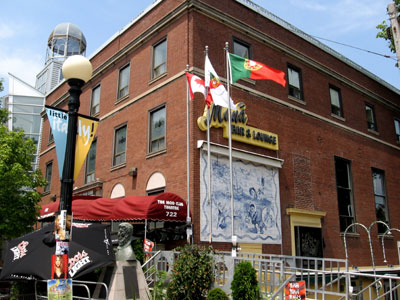
Images of Little Italy
Based on his own experience in his early years, Johnny Lombardi
had always been fighting prejudice. With his radio programs he started
to inspire tolerance, communication and understanding. Over the
next few decades the Italian community in Toronto and in many other
places became very successful, financially, socially and politically,
and in some ways has acted as a positive role model for other immigrant
groups that came later. Johnny was always aware of his humble roots
and always made time for community endeavours. He was an active
supporter and fundraiser for the Hospital for Sick Children and
many other charitable organizations, hospitals and community awareness
programs.
Until his passing in March of 2002 at 87 years of age, Johnny Lombardi
dedicated himself to the cause of multiculturalism and the celebration
of diversity. He was light years ahead of many with his early commitment
to this cause, and always felt that Toronto and its wonderful ethnic
mosaic had something special to share with and guide the world.
Former Prime Minister Pierre Trudeau was a good friend of Johnny’s,
also a proud Liberal, and they had many discussions about multiculturalism.
According to Lenny, his father had a significant influence on the
former prime minister, who once stated “Canada is not a bilingual
country, we are a multilingual country”.
Johnny’s pioneering spirit lives on in his son Lenny who
is equally passionate about promoting and celebrating multiculturalism.
Johnny’s oldest child and only son is the President of CHIN
Radio, and Lenny’s younger sisters have also picked up the
baton and are now running this family empire and continue to communicate
the message of tolerance and understanding.
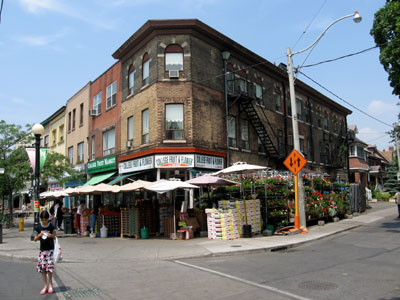
Images of Little Italy
Lenny adds that he works in an extremely culturally diverse environment
and that he has never had any issues in this context. He feels all
these diverse groups come together to make up something really special.
The famous CHIN Picnic, held for the first time in 1966 and every
year since then over the Canada Day Weekend, is one of Toronto’s
largest and most popular festivals. It brings people together from
all ethnic groups and denominations and was really Toronto's first
multicultural festival.
In fact, CHIN’s philosophy of embracing our culturally diverse
backgrounds is contagious: several former CHIN staff members came
together in 1967 to found Caribana, today
Toronto’s renowned festival of Caribbean culture. Lenny adds
that many ethnic and mainstream broadcasters around Canada today
have their roots at CHIN Radio.
Learning alongside his father ever since he was very young, Lenny
himself fell in love with broadcasting and cultural diversity. He
says he has always had a penchant for show business, but actually
has never been an on-air personality. Instead he has always been
a producer, so today he produces the CHIN Picnic, a variety of festivals
and concerts, as well as the Taste
of Little Italy, one of Toronto’s most popular street
festivals.
But Lenny admits that his role as a multicultural broadcaster also
comes with a huge responsibility. Lenny feels he has to lead the
way and personally demonstrate that we can all communicate with
one another, regardless of our ethnic heritage or religious affilication.
Especially right now as conflict has broken out between Israel and
Lebanon, he hears about the anguish among these groups through his
managers and broadcasters. Lenny says “every time a bomb drops
over there, we feel it here”. And he believes that multicultural
broadcasting has a significant role in allowing voices from different
communities to be heard, in creating dialogue. As long as we are
talking we have a chance at preventing conflict, and that's where
multicultural broadcasting comes in.
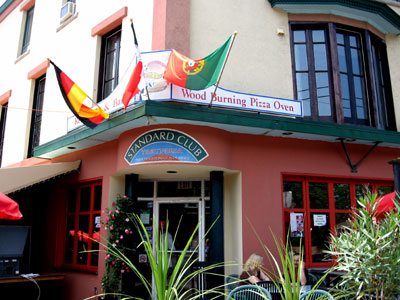
Images of Little Italy
I wholeheartedly agreed when Lenny commented that advocates of
diversity and multicultural broadcasters can make a huge difference
in building bridges between people from different backgrounds. He
adds that some people mistrust the “multiculturals”
since they have allegiances to more than one country or more than
one culture. On the other hand, the champions of multiculturalism
have a key role in bringing people together because they have an
understanding of people from several different places. Multicultural
broadcasters who have been in Toronto for a while have an important
role in potentially de-radicalizing recent immigrants by exposing
them to Toronto’s fascinating and diverse tapestry of ethnic
groups and by injecting a voice of reason and tolerance into sometimes
heated and emotional debates.
Lenny believes in small beginnings and says that small voices advocating
diversity will become the dominant voice of reason. I sincerely
hope that he is right. Through his programs over the last 40 years
he has heard the anguish and fear of many groups whose home countries
got entangled in bloodshed and conflict. He takes his responsibility
immensely seriously, recognizes the implications of his role and
feels it’s a privilege to dedicate himself to this cause.
He sums up his philosophy with two succinct statements: “understand
and respect your neighbour”, and “Toronto is like one
big minestrone, a mixture of all sorts of things that comes out
perfect in the end.”
Related Articles:
Celebrating Diversity
with my multicultural / multilingual team members
60 years after - some
personal history questions
My post-Mexico
reflections: why it is time for me to get involved
Why I love Toronto - this
most diverse cultural mosaic
Farzana Hassan - a progressive voice
in Canadian Islam
Voices of diversity: two Toronto
women create a Holocaust documentary
Christina Zeidler: hotelier, artist,
social entrepreneur and urban visionary
Skills for Change: Toronto-based
non-profit organization helps new immigrants
Scadding Court Community Centre sends
at risk youth to China, Mongolia and India for international learning
experiences
Bruce Poon Tip: global adventure travel
entrepreneur with a conscience
|